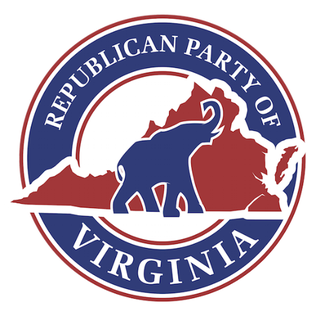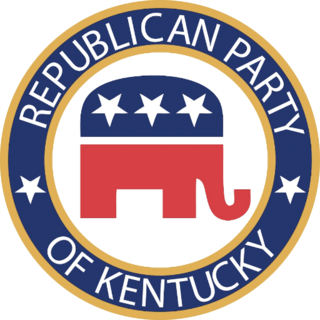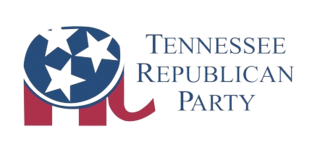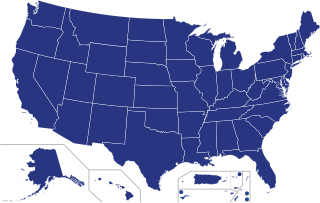Related Research Articles

Super Tuesday is the United States presidential primary election day in February or March when the greatest number of U.S. states hold primary elections and caucuses. Approximately one-third of all delegates to the presidential nominating conventions can be won on Super Tuesday,more than on any other day. The results on Super Tuesday are therefore a strong indicator of the likely eventual presidential nominee of each political party.

In American politics,the Southern strategy was a Republican Party electoral strategy to increase political support among white voters in the South by appealing to racism against African Americans. As the civil rights movement and dismantling of Jim Crow laws in the 1950s and 1960s visibly deepened existing racial tensions in much of the Southern United States,Republican politicians such as presidential candidates Richard Nixon and Barry Goldwater developed strategies that successfully contributed to the political realignment of many white,conservative voters in the South who had traditionally supported the Democratic Party so consistently that the voting pattern was named the Solid South. The strategy also helped to push the Republican Party much more to the right. By winning all of the South,a presidential candidate could obtain the presidency with minimal support elsewhere.

The Republican Party of Virginia (RPV) is the Virginia chapter of the Republican Party. It is based at the Richard D. Obenshain Center in Richmond. As of May 2024,it controls all three statewide elected offices and 5 out of 11 U.S. House seats.
A precinct captain,also known as a precinct chairman,precinct delegate,precinct committee officer or precinct committeeman,is an elected official in the American political party system. The captain establishes a direct link between a political party and the voters in a local electoral precinct. Their role is to build a relationship between those who hold public office and those who vote at the polls.

The Republican Party of Florida (RPOF) is the affiliate of the Republican Party in the U.S. state of Florida. It is currently the state's dominant party,controlling 20 out of 28 of Florida's U.S. House seats,both U.S. Senate seats,the governorship and all other statewide offices,and has supermajorities in both houses of the state legislature.

The Republican Party of Iowa (RPI) is the affiliate of the United States Republican Party in Iowa. The State Central Committee is chaired by Jeff Kaufmann. The RPI operates the Republican side of the Iowa caucuses and previously sponsored the Iowa Straw Poll.

The Republican Party of Kentucky is the affiliate of the Republican Party in Kentucky and follows its nationally established platform. The party's headquarters is in Frankfort,Kentucky.

The Tennessee Republican Party is the affiliate of the United States Republican Party in Tennessee. Since the mid-1960s,the state has become increasingly Republican. The current chairman of the Republican Party of Tennessee is Scott Golden. It is currently the dominant party in the state,controlling the majority of Tennessee's U.S. House seats,both U.S. Senate seats,both houses of the state legislature,and the governorship.
This article contains the results of the 2008 Republican presidential primaries and caucuses.

The 2008 Louisiana Republican presidential caucuses were held on January 22 and the primary on February 9,2008.

Voters of the Republican Party elected state delegations to the 2012 Republican National Convention in presidential primaries. The national convention then selected its nominee to run for President of the United States in the 2012 presidential election. There were 2,286 delegates chosen,and a candidate needed to accumulate 1,144 delegate votes at the convention to win the nomination. The caucuses allocated delegates to the respective state delegations to the national convention,but the actual election of the delegates were,many times,at a later date. Delegates were elected in different ways that vary from state to state. They could be elected at local conventions,selected from slates submitted by the candidates,selected at committee meetings,or elected directly at the caucuses and primaries.

The 1992 United States presidential election in Louisiana took place on November 3,1992,as part of the 1992 United States presidential election. Voters chose nine representatives,or electors to the Electoral College,who voted for president and vice president.

The 1988 United States presidential election in Louisiana took place on November 8,1988,as part of the 1988 United States presidential election. State voters chose ten representatives,or electors to the Electoral College,who voted for president and vice president.

The 2012 United States presidential election in Louisiana took place on November 6,2012,as part of the 2012 United States presidential election in which all 50 states plus the District of Columbia participated. Louisiana voters chose eight electors to represent them in the Electoral College via a popular vote pitting incumbent Democratic President Barack Obama and his running mate,Vice President Joe Biden,against Republican challenger and former Massachusetts Governor Mitt Romney and his running mate,Congressman Paul Ryan.

The 1992 United States presidential election in Mississippi took place on November 3,1992,as part of the 1992 United States presidential election. Voters chose seven representatives,or electors to the Electoral College,who voted for president and vice president.

The 1988 United States presidential election in Arkansas took place on November 8,1988. All fifty states and the District of Columbia,were part of the 1988 United States presidential election. State voters chose six electors to the Electoral College,which selected the president and vice president.

The 1988 United States presidential election in Georgia took place on November 8,1988. All 50 states and the District of Columbia,were part of the 1988 United States presidential election. Georgia voters chose 12 electors to the Electoral College,which selected the president and vice president. Georgia was won by incumbent Vice President George H. W. Bush of Texas,who was running against Massachusetts Governor Michael Dukakis. Bush ran with Indiana Senator Dan Quayle as Vice President,and Dukakis ran with Texas Senator Lloyd Bentsen.

The 1984 United States presidential election in Arkansas took place on November 6,1984. All fifty states and the District of Columbia,were part of the 1984 United States presidential election. State voters chose six electors to the Electoral College,which selected the president and vice president of the United States.

Presidential primaries and caucuses of the Republican Party took place in many U.S. states,the District of Columbia,and five U.S. territories from February 3 to August 11,2020,to elect most of the 2,550 delegates to send to the Republican National Convention. Delegates to the national convention in other states were elected by the respective state party organizations. The delegates to the national convention voted on the first ballot to select Donald Trump as the Republican Party's nominee for president of the United States in the 2020 election,and selected Mike Pence as the vice-presidential nominee.

The 1986 United States Senate election in Louisiana was held on November 4,1986. Democratic nominee John Breaux defeated Republican nominee Henson Moore with 52.82% of the vote.
References
- 1 2 3 4 5 6 7 "Commissioner - District 4". Louisiana Public Service Commission. Retrieved July 26, 2022.
- 1 2 "Michael G Francis". Jena High School Alumni. JHS Alumni Association. Retrieved July 26, 2022.
- ↑ "Republicans to cast ballot for State Central Committee". The Crowley Post-Signal. November 3, 1996. p. 11.
- 1 2 3 Maisel 2002, pp. 115–116.
- ↑ Zganjar, Leslie (December 11, 1995). "Louisiana fighting to be primary leader". The Argus-Press. Associated Press. p. 10.
- ↑ Steed & Moreland 2002, p. 80.
- ↑ Lenox, Charles (November 21, 1996). "Mike Francis survives strong challenge to state GOP position". The Daily Advertiser. p. 3D.
- ↑ Lamis 1999, p. 302.
- 1 2 "La. GOP Is Fightin' 'N Feudin'". CBS News. Associated Press. June 16, 1999. Retrieved August 3, 2022.
- ↑ Steed & Moreland 2002, pp. 80–81.
- ↑ Steed & Moreland 2002, p. 81.
- ↑ Maisel 2002, p. 115.
- ↑ "Louisiana GOP Scraps Caucus". The Washington Post (final ed.). Associated Press. December 12, 1999. p. A19. ProQuest 408546558
- ↑ "Republican PAC wants new state party machine". The Daily Review. Associated Press. January 14, 2000. p. 6.
- ↑ Coates, Guy (March 26, 2000). "GOP meets without rancor". Daily World. Associated Press. p. 2A.
- ↑ "Mike Francis begins common sense campaign". The Gueydan Journal. Vol. 14, no. 22. August 15, 1996. p. 1.
- ↑ Doucet, Janet C. (August 27, 1996). "Candidates discuss senate race issues". The Crowley Post-Signal. p. 1.
- ↑ "State Senate seat awarded". The Daily Review. Associated Press. September 23, 1996. p. 4.
- ↑ "Louisiana Secretary of State : Official Election Results : Results for Election Date: 9/30/2006". Louisiana Department of State. Retrieved July 26, 2022.
- ↑ "Francis elected to Public Service Com". The Rayne Acadian-Tribune. November 10, 2016. p. 1.
- ↑ Dennis, Howell (January 6, 2017). "Francis takes oath as Public Service commissioner; his district includes Vermillion". Abbeville Meridional. Vol. 161, no. 5. pp. 1–2.
- ↑ "Louisiana Public Service Commission elects Mike Francis as Chairman". Abbeville Meridional. Vol. 163, no. 24. February 3, 2019. p. 2A.